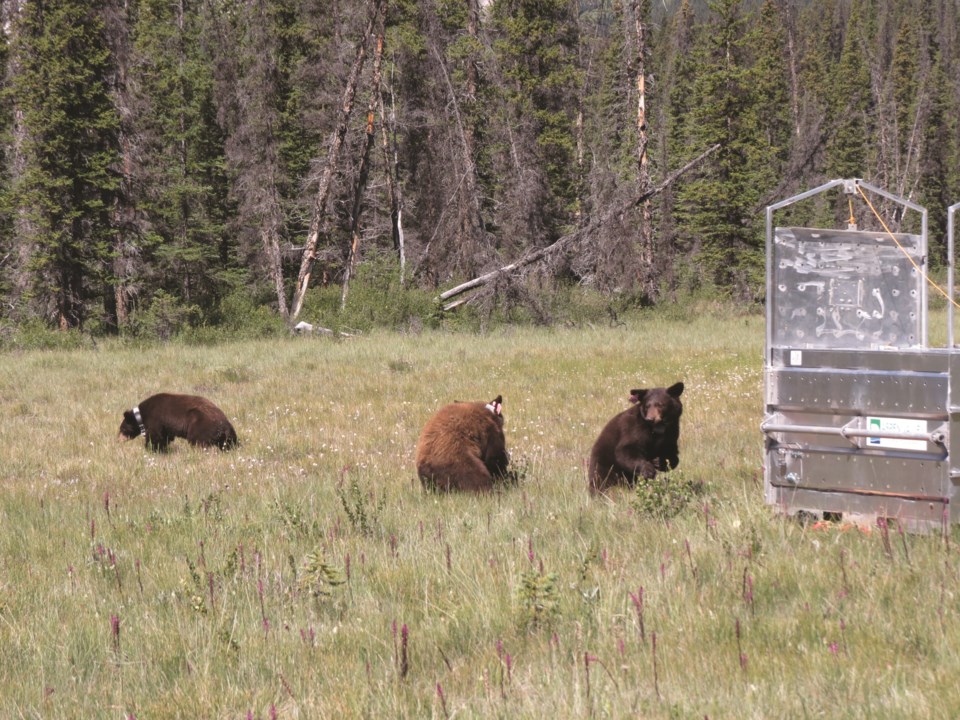CANMORE – A mother black bear was struck and killed on Highway 1A between Canmore and Cochrane on the weekend, orphaning two cubs who are being left to fend for themselves in the wild and hopefully make it safely into the dens.
On Sunday (Oct. 10), Alberta Fish and Wildlife Enforcement Services and RCMP received reports that a female black bear was killed after being hit by a vehicle on Highway 1A, between Cochrane and Canmore.
“After assessing the situation, Fish and Wildlife Enforcement Services observed that the two cubs had moved off the road into the trees and had no visible sign of injury,” said Laura Vilchis Sanchez, a spokesperson for the Ministry of Public Safety and Emergency Services in an email statement.
“In alignment with Alberta’s policy for orphan black bear cub rehabilitation, fish and wildlife officers determined that orphaned black bear rehabilitation was not necessary as the cubs were old enough to forage on their own.”
Fish and wildlife officers estimate that the cubs were around seven to eight months old.
"The rates of survival depend on many factors, such as the variety of predators they could face or if the cubs have good reserves to survive the winter," Vilchis Sanchez said.
"However, generally at this age, the cubs are old enough to forage on their own and survive."
Alberta’s black bear rehabilitation policy, finalized in 2018, gives Fish and Wildlife officers several options, including leaving cubs in the wild, raising and releasing cubs in rehabilitation facilities and placement in a zoo if other options aren’t available.
The last resort is to euthanize the cubs.
Under Alberta’s orphaned black bear protocol, orphaned cubs can only be admitted to approved rehabilitation facilities between January and July 1 every year, though exceptions can be made based on body condition, percentage of body fat, sickness or injury, time of year and environmental factors.
With black bears in Alberta entering dens between late September and early November, the policy requires they be released from rehab facilities in mid- to late October in an effort to ensure they have an opportunity to emerge from dens in spring as wild animals.
The policy also states cubs must be under one-year-old and not yet have denned the previous winter in order to be rehabilitated. Yearlings that have successfully denned over the previous winter are “not suitable candidates for rehabilitation upon emergence”.
In addition, cubs must be in good health with no serious injuries that require long-term vet care or obvious disability, although injured cubs will be evaluated by provincial wildlife staff in consultation with veterinarians, to determine suitability for rehabilitation.
According to the Cochrane Ecological Institute (CEI), which has been rescuing, rearing and returning orphaned bear cubs to the wild since 1985 and other wildlife since 1967, the policy needs fixing.
“We went to look for them but didn’t find them.”
Clio Smeeton, CEI president said Alberta’s current policy for orphaned bear cubs is flawed, particularly in an era of biodiversity loss, wildfire and climate change.
She said other jurisdictions accept orphaned cubs throughout the year, and at older ages, adding that female black bears can lactate for up to 14 to 17 months.
“Female black bears hibernate with their cubs for the second winter after the cub’s birth and the cubs arising from dormancy have sucked all winter … they have had a good start on their juvenile year which they will also spend with her,” Smeeton said.
“Orphaned cubs that are not rescued after June 30 of the year of their birth do not have the advantage of mother’s milk for 14 to 17 months, or their mother’s experience or protection and are more likely to come into the domesticated landscape, where they are likely to be killed.”
Smeeton also questions the protocol stipulating orphaned cubs in rehabilitation be released on or before Oct. 15 of the year of their birth.
“Fall is the time when there is the greatest die-off amongst bear cubs unprotected by their mom,” she said.
“If they’re unprotected and they don’t know where to go, they’ll follow their noses into the domestic landscape to help themselves to anything they can get.”
Of the six black bear cubs raised in captivity and released into the wildlife between 2018-20 under Alberta’s new protocols, four denned successfully.
Another was legally shot by a landowner after showing signs of habituation and not eating natural foods, while another was killed by another bear.
Provincial officials say captive-reared cubs can be successfully returned to the wild if proven prescribed protocols such as minimizing contact with humans and blind feeding are followed.
But Vilchis Sanchez said the purpose of wildlife rehabilitation is to help animals that cannot survive on their own without human intervention.
“In the case of orphaned black bear cubs, this is balanced with the need to ensure the bears do not become habituated to humans, increasing the possibility for future negative interactions,” she said.
“Whenever possible, the best option is to leave animals in the wild. Research on wildlife rehabilitation indicates that human intervention is likely to cause greater harm to these cubs based on their age.”
According to the province, the black bear population in Alberta is estimated at 40,000 bears.
Call 310-0000 to reach the nearest Fish and Wildlife office in cases where an animal is injured and unable to move or poses a threat to public safety.



